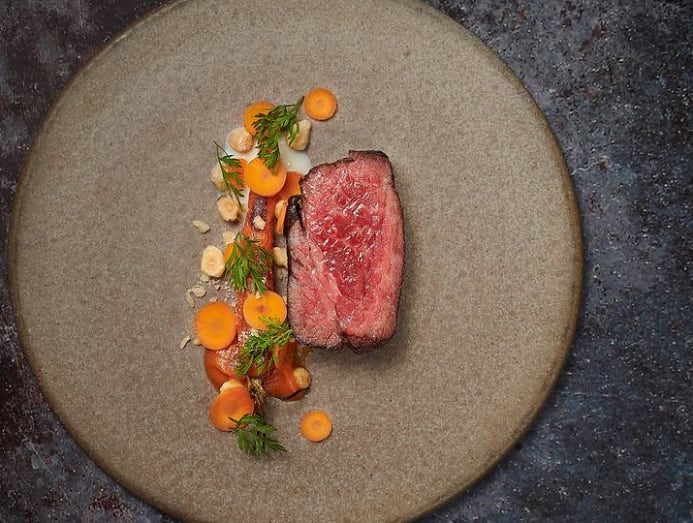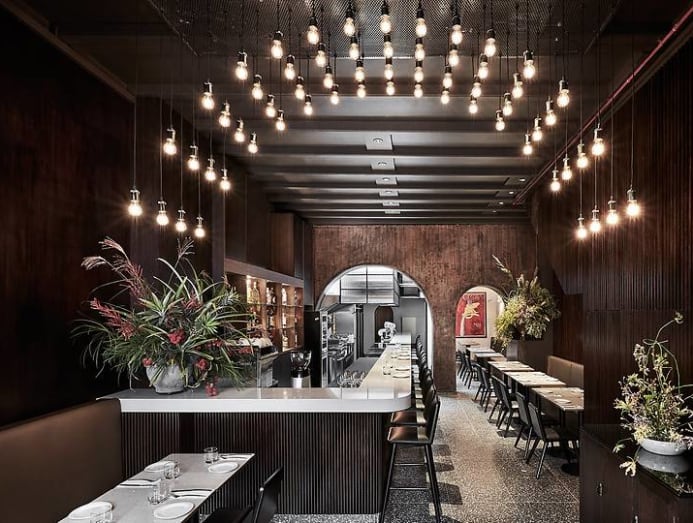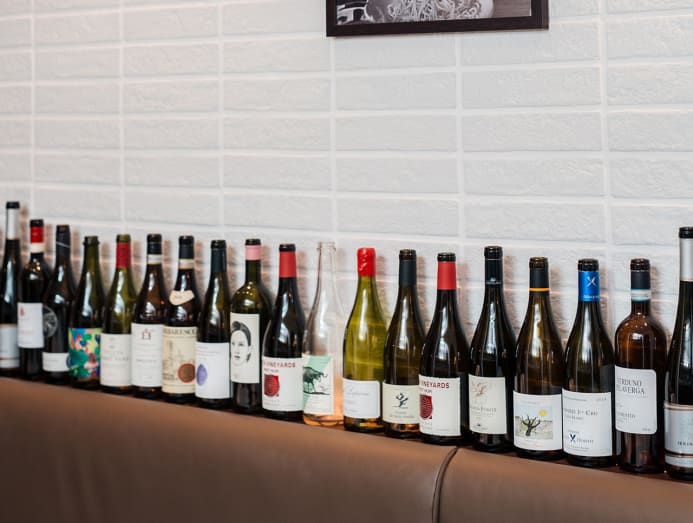How Singapore’s restaurateurs are rising to the challenges of sustainability
Rising nutrient costs, climbing rents and insufficient manpower are famously constant challenges in Singapore's eating house industry. Now add to that sustainability. Equally ecology consciousness and social responsibility become among the most talked-almost topics in the earth, restaurants have get the most accessible venues for customers to demand transparency and ethical practices.
Think about it: As a country whose national pastime is dining out, who amongst us doesn't want our meals to come from a place that is kind and nurturing to the environment, supports sustainable practices and creates piddling or cipher waste material?
READ> The chef who puts everything from fish bones to used coffee beans to delicious use
Today, in that location are numerous nuances to sustainability that a restaurant must consider, the biggest of which is waste product. "The reality is that our overall industry in Singapore runs at one.6 per cent profitability, which means something is incorrect. How much are we wasting every mean solar day?" asked Chris Millar, Culinary Managing director of the 1-Group, which is behind restaurants similar Summerhouse, 1-Distance and Botanico.
"Sometimes, the higher the turnover, the higher the wastage, which can result in college losses. So, sustainability must go deeper and beyond just saying nosotros buy fish from a local fish subcontract," Millar added.
Good restaurants have long fabricated information technology a point to use all parts of the produce it buys. Parlaying lobster shells into bisque and vegetable trimmings into broths have always been par for the course; it just wasn't something the manufacture crowed about.
But with the public heart on sustainability comes the need for visibility of this commitment to waste matter reduction. To that end, restaurants like Salted & Hung accept introduced menus that revolve around the creative use of even the scrappiest ingredients. Fish bones, for example, are infused with soy to yield an effluvious sauce, then dehydrated and turned into crispy crumbs which are used as garnish.

It'S Not EASY Being Light-green
The reduce, reuse and recycle mantra applies beyond food besides. In the last year, companies like Cicheti Ventures, The Lo & Behold Group and Spa Camaraderie Group have eliminated the apply of single-apply plastic straws, replacing them with reusable metal ones or straws made from biodegradable materials like tapioca.
Similarly, at the likes of Tiong Bahru Bakery, plastic bags are eschewed for reinforced paper bags, while plans are underway to supplant plastic juice bottles with glass ones, said parent visitor Spa Camaraderie Group'southward founder Cynthia Chua.

Ironically, sustainability is expensive and requires a substantial fiscal commitment. Because of factors like smaller economies of scale and higher compliance costs, eco-friendly options such as biodegradable packaging can cost up to three times the price of its eco-chancy plastic counterparts.
Norwegian fast-casual concept Pinkish Fish, which recently opened his start international outpost at Jewel Changi Airport, knows this well. Information technology uses only biodegradable and compostable materials for its packaging, cutlery and crockery. "It costs three times more (than plastic), just if we want to exist the change," said CEO Ronny Gjose, "nosotros must deliver."
Convincing diners to pay a premium for these practices requires some inventiveness. But it helps that today'due south diners take a 18-carat interest in the provenance of their food and drinks, how the produce is grown and the methods in which they are cooked.
All that makes for skilful stories – which are the lynchpin of good marketing – be they most honey from urban rooftop hives tended to past a former-banker-turned-apiculturist, or small-batch cheeses made past a lone fromager in a far-flung village in France. In sustainability terms, the route to a good story near produce leads back to traceability, an element that restaurants have too begun to focus on.
"For us, information technology'due south about reaching an audience who are concerned about sustainability, traceability and farm-to-table concepts," said Loh Lik Peng, founder and manager of Unlisted Collection, whose stable of restaurants include Nouri, Pollen and MeatSmith.
"We work closely with farms so that we have much more integrity and options in terms of organic produce. This is important even in our meat-axial restaurants considering people want to know where the meat is from, how the animals were treated and how they are smoked in the kitchens."
READ> Unique Nutrient Trails: Loh Lik Peng recommends rustic adventures in Italy
NATURALLY RESPONSIBLE
The push towards supporting sustainability has affected wine lists likewise. Increasingly, restaurants are spotlighting natural wines, which are farmed organically or bio-dynamically and fabricated without any additives or processing aids. "Minimal human intervention yields the most interesting outcomes and showcases the grape varietal in their truest forms," explained Ong Liling, director of Cicheti Ventures, whose establishments include Bar Cicheti and Fynn's.
"Non just that, by showcasing the winemakers, we are supporting a new way of farming that eradicates the employ of pesticide and chemicals in the soil and sulphites that are usually added during the fermentation procedure. Over again, the theme of bringing people back to nature is integral to the principle of sustainability."

No doubt, sustainability is a tricky subject – every endeavor to benefit seems to come with a contradiction. "Yous tin buy all the organic produce in the world, for case, but if it comes wrapped in a lot of plastic, then what's the point?" said Chef Julien Royer, who'southward eating house Odette recently won the pall of Asia'south Best at the Globe's 50 All-time Restaurants Awards.
"It'southward hard to talk about sustainability in restaurants because it's complicated. So I think for me, the most important thing is to ensure that we don't waste product annihilation."

Ultimately, bearing responsibility for the planet's wellbeing lies at the core of sustainability, and it is a journey that does not and should not have an endpoint. Similar any cracking movement of change, sustainability involves immense time, effort, financial delivery and a shift in mind sets that must permeate an entire organisation.
And as with all great things, the ancestry lie in the pocket-sized steps. As Ong said, "[Adopting sustainability] is a procedure that must be consistently nurtured and I truly believe that as long as a restaurant does its best to minimise wastage – in food, water and electricity – then that in itself is already a huge step."
READ> A guide to sustainable eating – for you lot, the planet and generations to come up
harrisonequesions.blogspot.com
Source: https://cnalifestyle.channelnewsasia.com/experiences/how-singapore-restauranteurs-are-practising-sustainability-2019-239626
0 Response to "How Singapore’s restaurateurs are rising to the challenges of sustainability"
Post a Comment